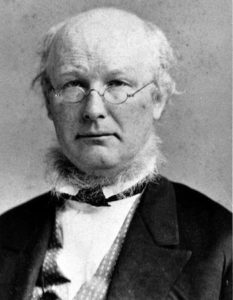
Horace Greeley
*Horace Greeley was born on this date in 1811. He was a white-American journalist and abolitionist.
He trained as a printer in Amherst, New Hampshire, moving to New York City, where he became a journalist. Greeley worked for the New Yorker and, in 1841, established the New York Tribune, a newspaper he edited for over thirty years. Greeley took a strong moral tone in his newspaper and campaigned against alcohol, tobacco, gambling, prostitution, and capital punishment. However, Greeley’s main concern was the abolition of slavery.
In 1838, Greeley agreed to edit the New York Jeffersonian, a Whig newspaper. He was interested in socialist and feminist ideas and published articles in the New York Tribune by Karl Marx, Charles Dana, Margaret Fuller, and Jane Grey Swisshelm. After the demise of the Whigs, Greeley supported the Free Soil Party. He was one of the movement's leaders against the 1850 Fugitive Slave Law and, in 1856, helped form the Republican Party. In 1860, Greeley supported Abraham Lincoln's presidential campaign. However, like many of the strong opponents of slavery, he was unhappy with how Lincoln dealt with John C. Fremont and David Hunter when they freed slaves in a territory they captured from the Confederate Army during the American Civil War.
On August 19, 1862, Greeley wrote an open letter to the president in the New York Tribune criticizing the president for failing to make slavery the dominant issue of the war and conceding moral principles for political motives. Lincoln famously replied three days later, "My paramount object in this struggle is to save the Union, and is not either to save or destroy slavery. If I could save the Union without freeing any slave, I would do it, and if I could save it by freeing all the slaves, I would do it." Greeley wrote several books, including Glances at Europe 1851, An Overland Journey 1860, a two-volume history of the Civil War, The American Conflict 1865, and his autobiography, Recollections of a Busy Life 1868.
Greeley was also critical of Ulysses G. Grant's presidency and became associated with the Radical Republicans. Later, he helped form the Liberal Republican Party. In 1872, the Liberal Republican Party nominated Greeley as their candidate running against Grant for the presidency. During the campaign, Thomas Nast produced a series of cartoons attacking Greeley. He commented that the venom of these cartoons was so bad that he "scarcely knew whether he was running for the presidency or the penitentiary." Greeley won 40% of the popular vote but died on November 29, 1872. One friend claimed he had been "crushed by the unmerciful ridicule Nast had heaped on him."